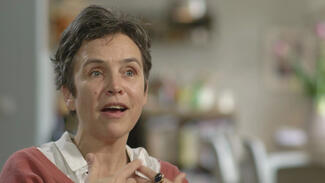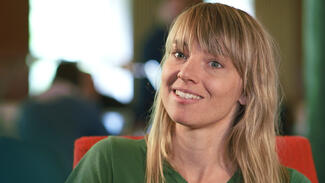
Joana Breidenbach: Technik, die wirklich was bewegt
Auch für gemeinnützige Organisationen und Sozialunternehmen ist die Digitalisierung eine große Herausforderung. Und Schwarmintelligenz lässt sich für die gute Sache einsetzen.
"The internet has so many opportunities but at the moment it's only a selected few people who are part of that."
Video abspielen
Das Internet ist eben nicht nur ein Hort von Kommerz, Propaganda und Zerstreuung: Es bietet auch die riesengroße Chance, das Leben vieler Menschen zu verbessern. Anne Kjaer Riechert hat in Berlin das Stanford Peace Innovation Lab eingerichtet, das soziale Innovationen vorantreiben will. Die ReDi School tut das ganz konkret und bietet Asylbewerbern in Deutschland mit IT-Kursen eine neue Perspektive.
The internet is just not all about money, propaganda and entertainment. It also offers the great chance to improve many people’s lives. Anne Kjaer Riechert has built up the Stanford Peace Innovation Lab in Berlin which wants to push forward social innovations. ReDi School does just that by offering IT courses to newcomers applying for asylum in Germany and giving them a new perspective.
Das Gespräch wurde am Rande der Tech Open Air 2017 in Berlin aufgezeichnet.
Jede Woche neu beim Stifterverband:
Die Zukunftsmacher und ihre Visionen für Bildung und Ausbildung, Forschung und Technik
Autor: Timur Diehn
Produktion: Webclip Medien Berlin
für den YouTube-Kanal des Stifterverbandes
How do we get, say, 600,000 people to collaborate on solving a problem together? It's incredibly complex.
That is where we need the technology to step in and create that kind of platform that allows people to communicate and talk. The great opportunity is, of course, we know exactly who is talking to whom at what time and we can pull that data out. And if we can analyze this in a way where we can really test what kind of collaboration is leading to the best kind of end results that is really solving the challenge that we set up in the beginning, we can start operating in a much smarter way in the way that we look at social challenges like poverty, like the refugee crisis but also very local problems, looking at how do we make more livible cities, how do we increase happiness in cities. And this was really my route into technology.
I was allowed by Stanford to start the Peace Innovation Lab here and start bringing the social innovation and social entrepreneurship community together with the tech and the start-up scene here in order to build bridges again and to share knowledge, do workshops on a monthly basis where we're looking at what kind of local challenges can we solve because most people might think that Berlin is a very peaceful society. But if you look at homelessness, if you look at challenges like obesiety, depression, there's plenty of issues that we can tackle in order to make a happier society or a happier city to live in, and this is what we wanted to tackle.
Facebook is a perfect exmaple of how you can build digital communities and how you can bring people together across borders and break down borders because in an online world where we draw, you know, national borderlines is not that evident. I mean, there are still divides online, and we can certainly work on those but I think it's wonderful to see people coming together because of shared interests, and I think we can do that online. But again it's the very early days of the internet. I think we haven't even started to really see what this could become. I think movements like Bitcoin are really challenging the way that our financial systems are operating, it's tremendously interesting. For me, what I'm really trying to work at is to see OK, the internet has so many opportunities but at the moment it's only a selected few people who are part of that, and a lot of that would be young, males who might be very privileged and sitting in the major cities in Silicon Valley or in Europe. And I think that we need to educate a lot more people I think. Programming should certainly be part of the curriculum, like mathematics have been for a long time. Because more people need to be part of that kind of conversation and need to influence and understand how society online could be working. And for me bringing more people into that conversation is important, so that is why we started ReDI School is to help train and then help educate and make people understand how they can get jobs or how they can be responsible citizens in an online environment. So for me what I would love to see is that we're able to find a way that we can educate especially people sitting insde, who are stuck in refugee camps, say, in Jordan, in Zaatari to understand how they could be doing jobs online because right now they are stuck but if they have internet access, if we can help them have laptops, even you could be doing work just through your smartphone as a way to take care of yourself, earn money and have jobs. I think that would make a huge difference.
So we started officially with 42 students in February 2016. Since then we had already 4 semesters which means that we now have around 250 students who have been through the programme. We currently have about 130 students who are studying with us across 10 different courses. So the direct impact that we've had on lives and encouraging people to study and keep improving themselves and training their skills, that is one part of it. But we can also see when we ask our alumni: What are you doing now? We can see that about 40 percent have either landed a paid job or paid internship. 30 percent are back at university studying, and the last 30 percent are continuing to take courses with us improving their skills and improving their network. So I think those numbers are really quite significant, and I think that is what we want to see more often and not just in Berlin but we are looking at scaling right now in two other German cities, starting with Munich, but also looking at how could we take the ReDI school model and help in places like Jordan. Could we imagine a ReDI school in Iraq helping the refugees there get jobs as well? But my strategy all along has been "Nail it before you scale it", so let's make sure that we know what we're doing. Let's make sure that it's a high quality product. When we know what the dynamics are, that it's also financially sustainable, then it is the right time to scale. And we're just there now which makes the future very exciting.
We have Heba and Hadir, two of our Egyptian female students, who came to us and were really quite shy and started studying with us and then have now become mentors and are actually teaching digital skills to elderly people, so Germans who are struggling to know how to use their mobile phones. So once a week they go and they work with all these like people in their 70s and 80s, and you can just see how they have become so proud and so confident. The last thing that they showed me was that they have created this like 70 page curriculum to teach other women how to use the computers. Because they realized that there is a lot of female refugees who have never, they don't have an email account, they don't know how to use Word and therefore don't know how to do online banking. They don't know how to get an appointment with the doctor online. And these two girls, sisters, have just decided this is just not good enough, so they have created this curriculum, printed it out. It's in 4 languages. And we never asked them to do it. They just saw the opportunity, they saw that there was a need and then they set out to do it. And I think it's tremendous to see, and I really like this approach, and that's what we're trying to install in all our students is "Pay it forward! Help others!" And only that way we can really, you know, get to everyone.